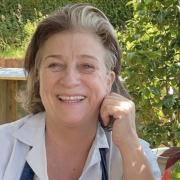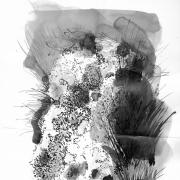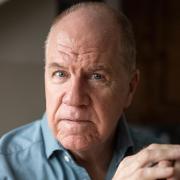Where do writers get their ideas? The usual answer is 'everywhere', but Brixham author Kate Furnivall found the idea for her recent book much nearer to home. When she died, Kate Furnivall's mother had only recently told Kate and the rest of the fa...
"My mother had always kept the story of her life a secret, because of the shame of being a penniless refugee. She was a fleeing White Russian who, with her mother, escaped to China in 1918, and the trauma had never left her," said Kate.
"I realised it was a powerful story, and too good to walk away from, so I decided to fictionalise it. I spent nine months researching the histories of these two countries as they were in 1928 and then wrote The Russian Concubine. And it seemed right to publish it under my maiden name - my mother's name - Furnivall."
The fictionalising of her mother's story is important and Kate likes to clarify the fact that she is not just writing a biography. "I loved setting my imagination free within the exotic and war-torn world of 1928 China. I made my main character a thief, and her mother became a drunk - both totally alien to my real mother and grandmother, for whom the words 'decency' and 'honour' were bedrock concepts."
The Russian Concubine is already a best-seller in the United States and is being published this month in England by Little, Brown, under their Sphere imprint, as their lead-up book for Christmas. It has now sold to numerous countries worldwide (UK, America, Germany, The Netherlands, Poland, Greece, Slovenia and Israel, with current interest from France) and earlier this year was published in the English-speaking territories - Australia, New Zealand, South Africa and Canada.
Unlike many novelists, Kate hasn't always written. As a child her mother encouraged interest in the philosophical ideas of Rudolph Steiner, the poetry of William Blake and the music of Chopin. But she and her twin sister told stories to each other in bed at night, so clearly the creativity muse was working away even then.
At university Kate studied English and briefly went into publishing in London before going into the world of advertising. She met and married her husband Norman - a crime novelist, writing under the pen name of Neville Steed, and moved to Devon to raise two sons.
She enjoys the research process and says it takes a great effort of will to shift from researching to writing. "The novel grows in my head as I am absorbing all the relevant and often irrelevant information, ripening like an apple. The theory is that it will tumble freely onto the page when I pick up my pen. In my dreams!" she adds wryly.
"Writing is extremely hard work. I start early in the morning in bed, so that the unconscious stuff churning away overnight can transfer to the page without domestic distractions. Later, I write in the garden in summer, in front of the fire in winter, or in my study. I write by hand because it feels important as part of my creative process. The words must flow like lifeblood on to the page. In the evening I type and edit on the computer, my closest friend, without whom I couldn't possibly write novels. But like all friends, we fall out sometimes, and I swear at it like a fishwife."
All Kate's hard work had a happy ending when The Russian Concubine sold to international publishers, with contracts for two more books. "Quite literally, the news took my breath away," says Kate. "I recall hanging on the end of the phone unable to breathe when my agent rang with the first offer."
A coast-to-coast promotional tour of five cities across America followed, one of the subsequent highlights, arranged by the US publisher, Berkley. "I had bucketloads of fan mail that touched me deeply," Kate said, "and now the book has been selected as a major front-of-store title by store-chains across the USA and South Africa."
But the highs are necessary, she insists, "because once I'm well into the next book,
I'm wondering how I'm ever going to climb out of the hole I've dug for myself, and then the grisly lows and fretful sleepless nights come as the other side of the coin."
She feels that writing is a voyage of discovery, during which you have to fall in love with your characters. "But it's also a responsibility. People trust you and you owe them your best in return. And that's where the real problems start - with success. Expectations are higher for your next book, there's a website to set up, the publicity circus to be coped with, arguments over book-cover blurbs, and particularly the agony of getting everyone to agree over the book title!"
Kate has finished another big emotional epic set in 1933 Russia (to be published in 2008) and is now about to reunite with the characters in The Russian Concubine and embark on a new journey with them. She emphasises that "it's not a sequel, as it will stand firmly on its own two feet".
Readers will no doubt wait breathlessly for this new book, which Kate says she is writing with some trepidation, but "already I can feel the adrenaline flowing, and the pen twitching in my fingers".
CHRISTINA GREEN


























